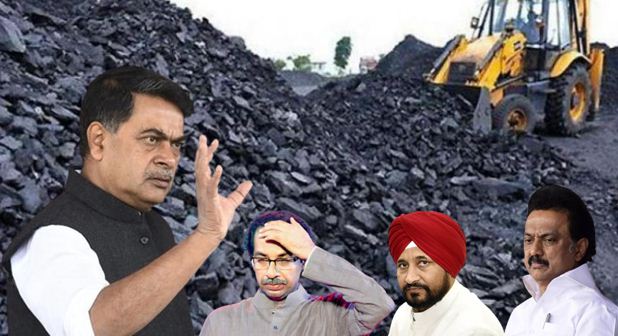Over the last few days, there have been attempts by the opposition to push the Narendra Modi government on back-foot by over-exaggerating the coal-shortage issue. Now, it turns out that the state governments which owe a massive Rs 20,000 Crores to Coal India Limited were trying to gaslight the central government into the guilt of their own failure.
States owe 20,000 Crores to Coal India Limited
Despite being reminded multiple times to pay their dues, various states owe a total of more than Rs 19,900 Crores to Coal India Limited, the government-owned coal mining, and refining corporation. The total number of defaulter states is 10, which includes Punjab, Madhya Pradesh, West Bengal, Tamil Nadu, Maharashtra, and Rajasthan. Talking to CNN-News18, government officials told that in spite of such a huge chunk of money ending as a debt obligation with the state governments, the central owned CIL has not stopped coal supply to them. Moreover, it has also been reported that various states had refused the excess supply of coal in June when the centre was providing it in abundance.
The officials further elaborated on how the delays in the supply chain due to monsoon and extended rainfall impacted the coal supply, leading to the rumours of shortage in the country. The government has deployed more than 350 train rakes to enhance the supply of coal in the country.
Other than huge debt, one other factor, i.e. three to four times hike in coal prices in international markets was the big reason behind the coal-shortage perception. Since a lot of coal plants use imported coal to produce electricity, a rise in prices in the international market directly impacts the factories.
Reminders about the dues went unheard by states
Sharing information about the reminders sent by the coal ministry to states to pay their dues, the officials informed that they were sent in January, April, and May this year. Moreover, Union Power Minister RK Singh had also personally written to the state governments regarding the payments. Other than coal ministries, states in India owe a total of Rs 1.6 lakh crores to power distribution companies, which always has the potential to snowball into a major power crisis in the country.
State governments hampering the production
The officials also told that various state governments have been given clearances by the central government to operate their coal mines, but the state governments have held the process back. Jharkhand and Rajasthan are two major states whose governments have held back the electricity production in the state. Out of these two, Jharkhand mines alone have the capacity of using 34,000 million tonnes.
Read more: There is no coal shortage in India but the opposition and the left disagree
Opposition tries to create an atmosphere of uncertainty
Recently, Delhi chief minister Arvind Kejriwal created an environment of uncertainty and chaos in the country by claiming that the national capital could face a power shortage. The claim by the chief minister was strange as only two years back, his party had decided to put a complete ban on the use of coal in Delhi. Similarly, Punjab Chief Minister Charanjit Singh Channi also claimed that three thermal power plants have been forced to shut down in Punjab. These irresponsible statements ended up creating an atmosphere of fear in the country. Finally, the power minister himself had to come forward and quell all the fake rumours around the issue.
Read more: Coal Crisis: A fabricated scheme created by anti-India forces to shame India internationally
Facts do not support opposition claims
At present, the central government’s supply is enough to run coal plants for five days. However, efforts to correct the supply chain disturbances are in and this 5-days window will be increased to fifteen days in a fortnight. India produced 315 million tonnes of Coal in April-September this year, a remarkable rise of 12 per cent from 282 million tonnes last year. Keeping this year’s production in mind, there is absolutely no way India could face a coal crisis in the current fiscal year.
Read more: Is India really facing a power crisis? Here are the facts
If blaming personal failure on someone else is an art, then state governments in India are Picassos of it. At a time when India is working on increasing its power capacity in both renewable and non-renewable segments, these kinds of rumours may benefit opposition parties for a short time, but it’s hampering India’s image on the international stage.
